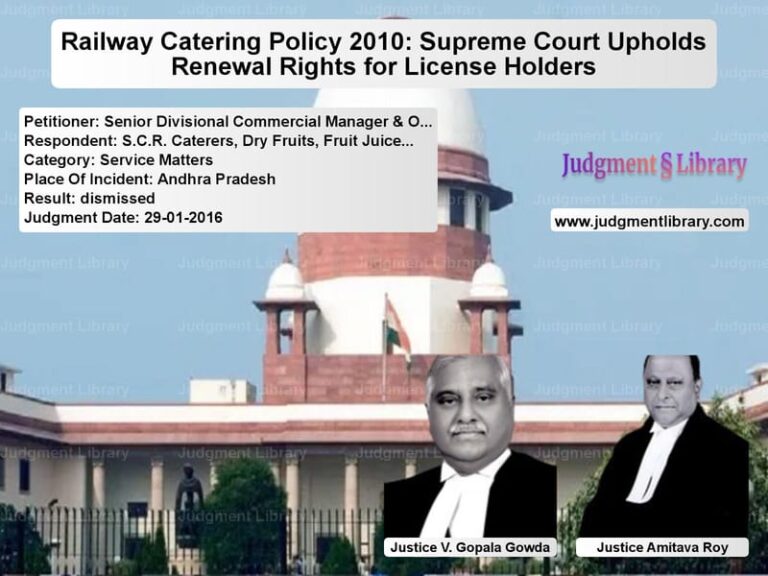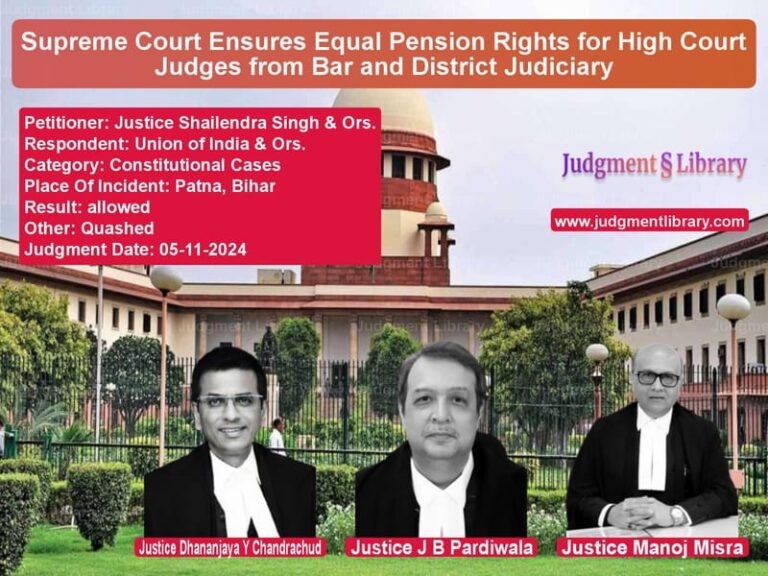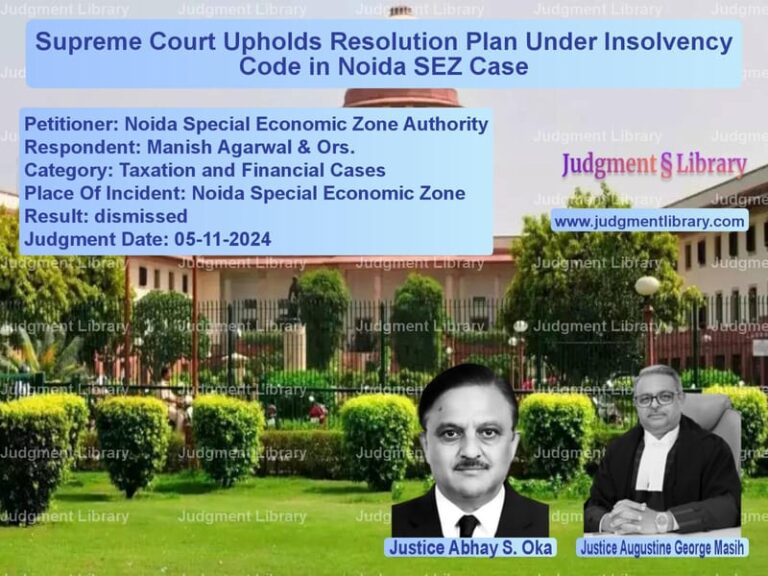Vodafone Essar Cellular Withdraws Income Tax Appeals: Supreme Court Disposes Case
The Supreme Court of India recently ruled on a significant tax dispute involving Vodafone Essar Cellular Ltd. and the Assistant Commissioner of Income Tax, Cochin. The case revolved around multiple appeals filed by Vodafone Essar Cellular regarding income tax assessments. However, during the course of proceedings, the company sought to withdraw the appeals, leading the Supreme Court to dispose of the matter without imposing any costs.
Background of the Case
The case stemmed from Vodafone Essar’s disagreement with the Income Tax Department over assessments related to the company’s operations in India. Several civil appeals were filed before the Supreme Court, including:
- Civil Appeal Nos. 1045-1052 of 2011
- Civil Appeal No. 10676/2013
- Civil Appeal Nos. 10674-10675/2013
- Civil Appeal No. 1202/2011
- Civil Appeal No. 1203/2011
During the course of proceedings, Vodafone Essar Cellular filed Interlocutory Applications (I.A.) seeking amendments to the applicant’s name and modifications in the cause title. Alongside these procedural requests, the company also moved applications seeking permission to withdraw the appeals for reasons outlined in their submissions.
Arguments by the Petitioner (Vodafone Essar Cellular Ltd.)
- The petitioner argued that the pending civil appeals had lost relevance due to changes in financial and legal circumstances.
- They emphasized that the withdrawal was voluntary and was not influenced by any external factors.
- They submitted that continued litigation in the matter would not serve any practical purpose given the evolving regulatory and tax policies.
- The company assured the Court that it was taking necessary steps to resolve all tax matters in compliance with the law.
Arguments by the Respondent (Assistant Commissioner of Income Tax, Cochin)
- The Income Tax Department did not oppose Vodafone Essar’s request for withdrawal.
- The Department agreed that if the petitioner no longer wished to pursue the appeals, the matter could be disposed of accordingly.
- However, the Department maintained that it had acted in accordance with tax laws and regulations during the assessment process.
Supreme Court’s Key Observations
- The Court noted that the applications for withdrawal were not opposed by the Income Tax Department.
- The Justices stated that since the petitioner had voluntarily sought withdrawal, there was no reason for the Court to deliberate further on the merits of the appeals.
- The Court granted permission for the withdrawal and directed that all pending appeals be disposed of.
Final Verdict
Based on its observations, the Supreme Court:
- Allowed Vodafone Essar’s request to withdraw the appeals.
- Disposed of all civil appeals as withdrawn.
- Clarified that there would be no order as to costs.
Implications of the Judgment
This ruling carries several important implications for corporate taxation, legal strategy, and tax dispute resolution in India:
- Corporate Taxation Strategy: The case highlights how companies assess the cost-benefit ratio of continuing tax litigation versus opting for alternative dispute resolution mechanisms.
- Legal Precedents: The ruling reaffirms that petitioners have the right to withdraw appeals when both parties mutually agree.
- Efficiency in Judicial Process: The Court’s decision to allow voluntary withdrawal promotes judicial efficiency by avoiding prolonged litigation.
- Tax Litigation Trends: The withdrawal of a high-profile tax case such as this may indicate shifts in corporate strategies towards resolving tax disputes outside the courtroom.
- Potential Financial Settlements: Though the Supreme Court did not explicitly comment on any financial settlements, the decision to withdraw may suggest an internal resolution between Vodafone Essar and the tax authorities.
Analysis of Tax Dispute Withdrawal Trends
The withdrawal of tax-related appeals by major corporations has been observed in other cases as well. Several factors can contribute to such decisions:
- Changes in Tax Policies: Amendments in income tax laws may alter the legal standing of ongoing disputes, making litigation redundant.
- Financial Considerations: Corporations often assess the financial implications of prolonged litigation, including legal costs and reputational risks.
- Settlement Agreements: Companies may reach settlement agreements with tax authorities to avoid uncertainty in judicial outcomes.
- Regulatory Pressures: Governments and regulators may encourage companies to resolve tax disputes amicably to create a more investor-friendly business environment.
Impact on Future Tax Litigation
The Supreme Court’s acceptance of Vodafone Essar’s withdrawal request sets a precedent for future cases. Companies involved in tax disputes may now be more inclined to withdraw appeals if they determine that continued litigation does not align with their business interests.
Conclusion
The Supreme Court’s decision in Vodafone Essar Cellular Ltd. vs. Assistant Commissioner of Income Tax, Cochin marks the conclusion of a long-standing tax dispute. By allowing the voluntary withdrawal of appeals, the Court has ensured judicial efficiency and reinforced the principle that parties can choose to settle or discontinue litigation based on their evolving interests. This ruling serves as a reference point for corporate entities engaged in tax disputes, emphasizing the importance of strategic litigation management in India’s evolving tax landscape.
Petitioner Name: Vodafone Essar Cellular Ltd..Respondent Name: Assistant Commissioner of Income Tax, Cochin.Judgment By: Justice Uday Umesh Lalit, Justice S. Ravindra Bhat, Justice Bela M. Trivedi.Place Of Incident: Cochin, Kerala.Judgment Date: 29-09-2021.
Don’t miss out on the full details! Download the complete judgment in PDF format below and gain valuable insights instantly!
Download Judgment: vodafone-essar-cellu-vs-assistant-commission-supreme-court-of-india-judgment-dated-29-09-2021.pdf
Directly Download Judgment: Directly download this Judgment
See all petitions in Income Tax Disputes
See all petitions in Tax Refund Disputes
See all petitions in Judgment by Uday Umesh Lalit
See all petitions in Judgment by S Ravindra Bhat
See all petitions in Judgment by Bela M. Trivedi
See all petitions in allowed
See all petitions in Declared Infructuous
See all petitions in supreme court of India judgments September 2021
See all petitions in 2021 judgments
See all posts in Taxation and Financial Cases Category
See all allowed petitions in Taxation and Financial Cases Category
See all Dismissed petitions in Taxation and Financial Cases Category
See all partially allowed petitions in Taxation and Financial Cases Category







